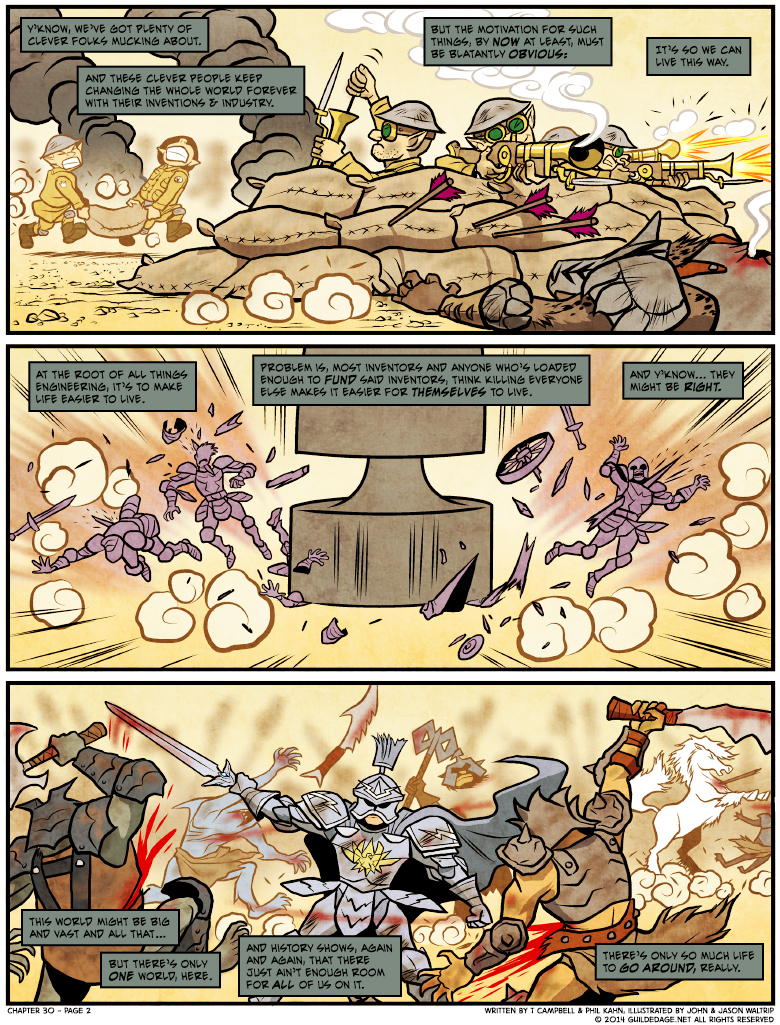Annotated 30-2
 Oh, yayyy it’s the Silver Centurionnn not even doing the magick stuff that’s supposed to be most of his dealllll
Oh, yayyy it’s the Silver Centurionnn not even doing the magick stuff that’s supposed to be most of his dealllll
It’s only just now occurring to me (as I write this annotation, a week or two in advance) that maybe Phil intended that absence of superpower as a hint that this is not the real Centurion. But we do later have Ardaic materialize that armor out of nothing, and he talks about passing his power on to another, so… (shrugs)
Earlier version had this as “There’s only one Arkerra.” Goblaurence’s generalizations do seem a bit less prescient in light of later revelations that the kingdoms of Arkerra don’t cover nearly as much of the planet as our civilization does of Earth. Yeah, you’ll run out of resources eventually, Gobs, but if Arkerran peoples really wanted to live peacefully with their neighbors, they could do it for untold generations before the wells started running dry. It’s just easier to take your neighbors’ shit than find new shit, is all. Same reason Earth had wars even back when there were fewer than 500 million people on it.











I disagree with the annotation at the end a little bit. I believe it’s not merely that taking other’s shit is easier, but that we don’t truly know the finity of… anything, really. The uncertainty tends to drive people to either extreme: Either they think it’s practically infinite and abuse them without restrain or they think we’re at a breakpoint. But hey, that’s just a random internet idiot’s view.
To me, it’s similar to how people shouting “THE WORLD IS ENDING!” has existed for as long as mankind has. I guess if there were cavemen saying it… they were right…
You have a point. It’s not simply easier to take other people’s shit, it also seems to be a built-in assumption with many humans that anything must be a null-sum game: I can only win what the other loses. And nothing really feels like a proper win unless somebody else properly loses. Though I suspect that might very well be because making new stuff from scratch is in fact often harder than taking someone else’s — particularly if the someone else know how to make that stuff from scratch and you yourself do not. In such an environment being really good at taking other people’s stuff is super helpful, which might then also explain why humans seem to really *want* to compete against “the others” rather than cooperating: Our history is full of taking from others and trying to prevent others from taking from us. That has to leave a mark on the human psyche.
If you consider things from a perspective of “maintaining balance”, then the central excuse you’d necessarily have to find for war in such a worldview is basically that the other guy is pushing things out of balance. And then you’d also necessarily have an objective that is not intrinsically murder of the other guy; you just need to stop them, and that’s only one option for doing it.
On the other hand, if you look at the world as a competition between predator and prey writ large, there’s no balance to begin with (except maybe in terms of controlling population sizes); it’s a conflict that can only reach balance if one participant or the other meets their end.
Our society translated the latter worldview onto a game of resource acquisition, where the one with fewer resources is naturally the prey of the one with more. The concept of balance never really entered into that equation, because the resources needed kept changing and limits on “fair play”, or propriety, kept being subverted or destroyed.
Somehow, we’ve come to think of this as “progress” – I think because we’re not paying very close attention to anything that isn’t part of the latest metagame in the resource acquisition food chain game – but if you consider things with your objective being a balancing act, then it’s very hard to imagine that a rampancy of competition is somehow an act of “balance”.
On the other hand, acknowledging that rampancy might necessarily lead to endorsing a kind of war for balance.
But I don’t believe that take naturally leads into thinking we’re at a “breaking point”.
Because, for starters, that takes for granted the idea that the philosophy of balance has adherents in relatively equivalent numbers to the philosophy of a fight for survival – or that the two must approach the clash between these ideologies in the same exact manner.
And as I’ve pointed out, there are more ways to “win” a war for balance than a war for dominance.
The evocation of World War I era trenches in the first panel is interesting. I don’t really know if it was intended to mean anything, but it’s interesting.
I think it represents the next phase of Arkerran military history now that Arkerra’s Industrial Age has truly started. Tanks are already present, so trench warfare is long overdue.